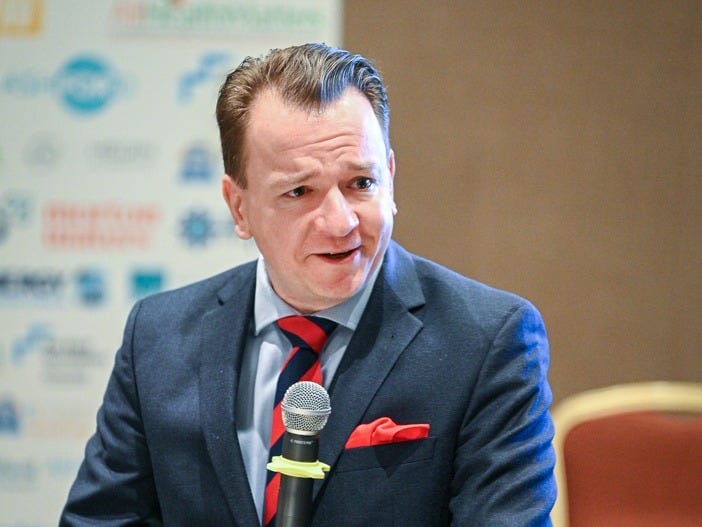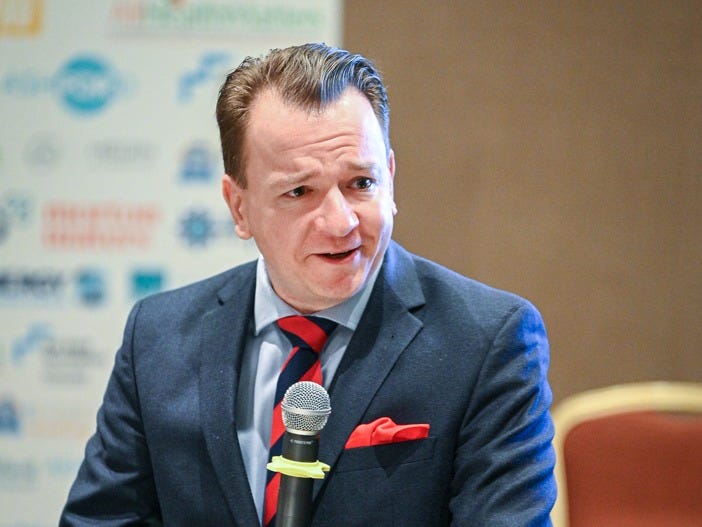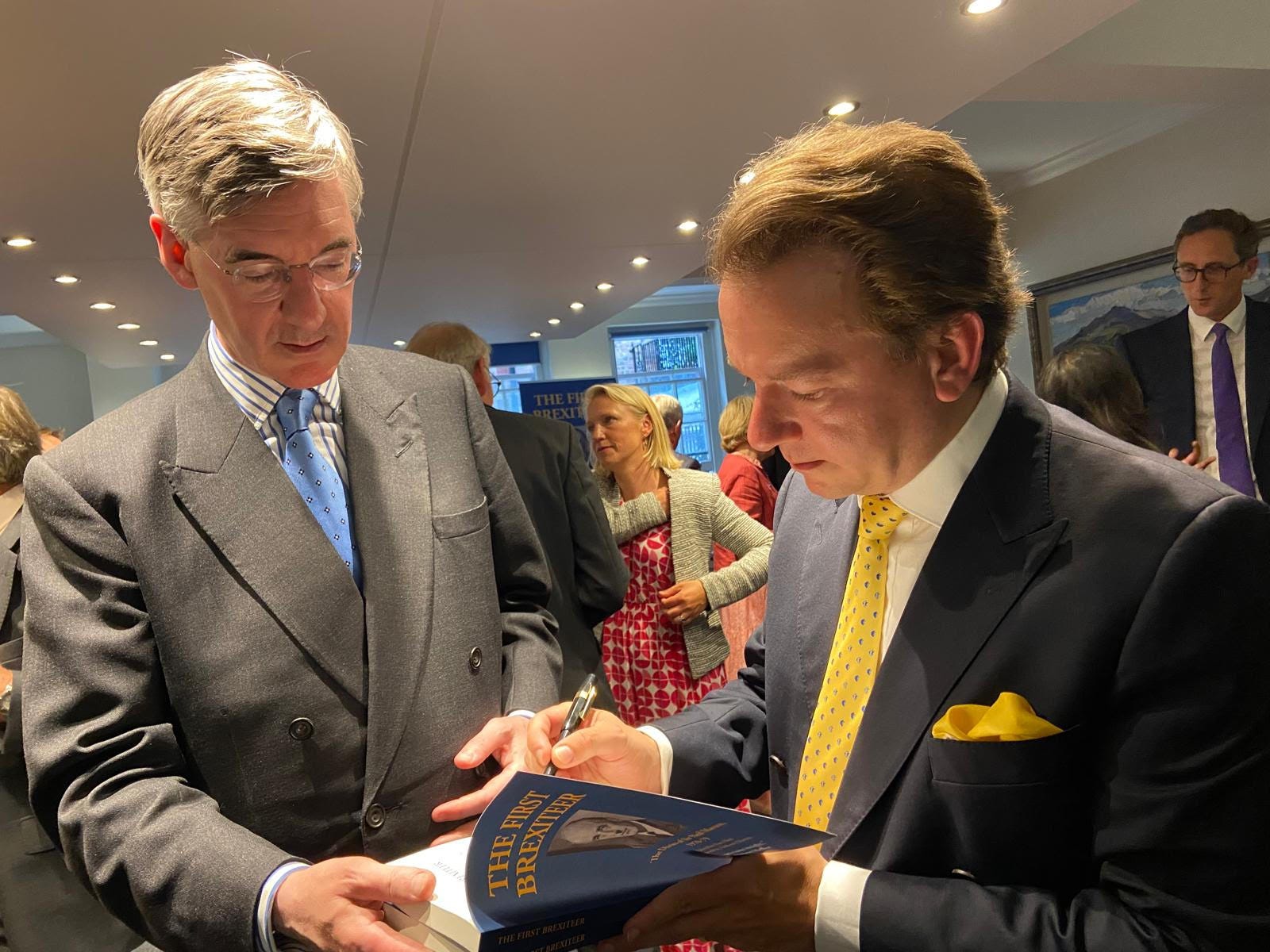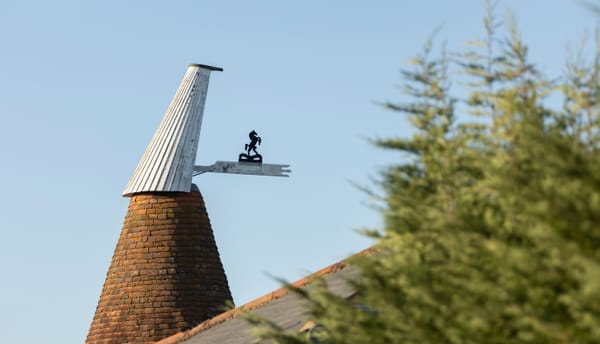“You get a lot more political power by persuading people than you do by crushing them”
What we asked Tim Aker, former Member of the European Parliament

Tim Aker is the Development Manager for the Federation of Small Businesses in Kent and Medway. He did his doctoral thesis on Margaret Thatcher and was a UKIP Member of the European Parliament. Steven met Tim to talk about Thatcher’s Praetorian Guard, his journey from MEP to FSB, his book The First Brexiteer, and lots more.

How would you describe the Federation of Small Businesses?
It's a support organisation to encourage people into self-employment. To support small businesses through their journey and to provide essential backup if and when things go wrong. For instance, there's a 24/7 legal hub, there's free tax investigation support and cover, there's a HR hub, there's lots there, and it's very comprehensive to support small businesses as and when they need it, because, as you and your readers will appreciate, it's a tough journey. It's getting a lot tougher. But when done right, it can be one of the most rewarding things people can do.
And how did you end up there?
A very convoluted journey that starts by leaving the European Parliament via an Amazon warehouse and seeing a job advertised. I thought with my experience being a local authority councillor, with my public affairs experience in local government and European government and with the media, PR, and press requirements that come with this job that I've done on-the-job training over the years. I ticked all the boxes and I've been able to put a strategy and plan in place, and seeing that play out has increased the new joiners by 25% in the four years I've been doing it, which, in two recessions, if I may modestly say, ain't half bad.
How did you successfully negotiate periods of free parking in Medway?
I asked for them. This is the thing, right? Everybody believes public affairs can be very convoluted, but start with a start. Everything's in negotiation. You go high, they go low. Seeing the problems that retail had, particularly with covid, I spoke with the officers and said that the banks leaving the high street was the third or fourth domino down the line. And when people go to Hempstead Valley or go to Bluewater, they get free parking. You need that extra pull factor for the high street. Free parking incentivises that. We said that you need periods of free parking. If you want to stay all day, of course you should pay something. Particularly if you're going onto the train to go into London. You're not spending your pounds and shillings on Rochester High Street, for instance. We wanted periods of free parking, so that if people wanted to go do their banking, they can have a cup of tea at Store 104. They can buy a book there, can do more impulse purchases, and it's a pull factor on it. And we got it.
The problem is local government is told what to do by central government and given barely any resource to be able to do that and the sad reality was the period of free parking didn't last that long, but when it did, it really helped our members in Medway and we will keep banging the drum for this, but as I say to Vince (Maple, leader of Medway Council), I don't envy the task he's got. I actually think they should call it local administration rather than local government. Government implies a sense of control. What they've got is unfunded mandates and very, very little wiggle room. I know, for people who aren't so clued up on local government, they are told what they've got to do. If they don't do that, it doesn't matter whether they've got the money to do it, they've got to find the money to do it. Everything else comes second to that.
They have a priority list of things to do and very, very, very few resources to do it, and they've got the spectre of reorganisation over their head. Yeah, I really don't envy them their task. We have a lot of positive work with Medway Council, and the best thing that they did was sign our FSB pledge when they came in within their first 50 days, not even their first 100 days. It designated an officer, who is the point of contact for small businesses. You go to any local government website, I don't know who makes them, but please stop, they're unusable and unworkable. People just don't bother. They want to speak to someone with a name who can meet them, empathise with them, which a recording can't, which an AI automated chatbot can't yet. They want to either vent or talk through their problems. I've tried to export that revolution to other boroughs. It's been a challenge, but you've got to ask.
In a convoluted way, to answer your question, we asked.
Just picking up on what you said there about local administration rather than government, when you look at what the new KCC administration is saying, and their Department of Local Government Efficiency, do you think that they will be able to find areas for efficiency?
I wish them every success, but there is a problem between highlighting what has been spent and the judgment that one calls it waste and saving money on future spend because that money has already been spent. If they're seeing wasteful programmes that continue to be spent and aren't mandated by central government, because if a local authority is told what to do by central government, there is no wiggle room. Anyone who has experience of planning will emphasise, you don't want it built on that green bit, but it's in the plan, you've got no choice. If they can find delegated decisions that are wasteful and can cut them and save money for taxpayers, marvellous. But the best bit of advice I'd give them is to learn. It's a very difficult task. I spent a period of time at Thurrock Council learning, just taking everything in. They've been given a great task by the people of Kent, and in politics, you seldom get a second bite of the cherry. Take your time, there's no need to rush.
Who was Sir Neil Marten?
He was the first Brexiteer, I'm reliably told by this wonderful book that is on Amazon, in Waterstones and any reputable bookshop. Sir Neil Marten was the First Brexiteer, chairman of the No Campaign in the ‘75 referendum. He was the Conservative MP for Banbury, a member of the executive of the 1922 committee, which is the Conservatives' trade union for MPs. They're the ones who MPs go to if they've got a problem, and then they take it to the leader or the Prime Minister. It's a very important committee in the Conservative parliamentary party. He was a transformational politician because he introduced the notion of rebellion into parliamentary politics, which we take for granted today. If you look back at the first application to join Europe in 1961, only one Conservative MP voted against it. Only one. I think only five or seven MPs in total voted against. The defiance of the whip was very rare.
Neil Martin decided that the sovereignty of the country was too important to put party before country, and he corralled a group of Conservative MPs to rebel against the accession to the European Economic Community, as the EU was then known, in 1972. On 17 February 1972, 15 Conservative and Unionist MPs voted against a confidence measure which very nearly brought the Ted Heath government down. And they were only saved by Liberal votes. At the time, your readers and subscribers, particularly younger ones, will be shocked to hear that at that time the Labour Party were against Europe and the Conservatives were fully in favour. The Labour MPs were fervently against it, and some were so upset that the Liberal leader had saved Heath that they grabbed him by the lapels and dragged him over to the benches. An extraordinary scene, absolutely extraordinary scene. Labour pro-marketeers, as pro-Europeans were then known, were seen crying, their faces as they were being basically pushed through the lobbies to vote against it.
On the Conservative side, MPs were threatened with deselection, and you very nearly had UKIP 20 years before they formed. Several constituency associations threatened their MPs with deselection because, at the time, boundaries were changing, and Conservative associations could use a technicality as the boundaries were changing to reopen nominations for the next election. That happened to one MP, Ronald Bell. Marten and his colleagues decided to pre-empt all of this. Their associations weren't happy. They said, if you push us too far, we will cause a by-election. There were six Conservative MPs that threatened their associations one way or another to do it. One of them, Robin Turton, the Father of the House, elected during Baldwin's time. This is how far back it goes. He was Father of the House, not what you'd call a swivel-eyed headbanger. And on the 29th of February 1972, he goes to the front page of the Times and says, I will stand in the by-election against my own party on the provision that Labour step aside. Labour don't take him up on that offer. But imagine for a moment if they had, you've got the man whose family goes back generations in the constituency, been there 40 years, you would have had the Tories fighting each other openly. It would have been the Clacton by-election 40 years before the event.
Why did you decide that you needed to finish a book about him?
This is where, as a historian, you find things that you'd assume would never be there. My Master’s, I wrote a thesis on the rebellion. I have a personal interest in this, having been, for my sins, a Conservative and also being an MEP and with a fascination of history. This was interesting, and nobody had really written about it. There's a fascinating book called Conservative Dissidents by Lord Norton. Wonderful historian. It just glosses over this. You go through the archives, and I saw there was an archive, Neil Marten's papers were deposited at the Bodleian Library in 1986, a year after he died. I consulted the archives, and there's a lot here. I thought, let's turn it into an academic paper, get some peer review element in all this. I had the best peer reviewer of my exam, Dominic Sandbrook. I went to visit the son of Sir Neil Marten, who's the copyright holder, to talk about my research and get his permission. After lunch, he says, ‘You might be interested in these,’ and comes up with a stack of his father's diaries. When I picked myself up off the floor, I asked him, ‘Can I do this?’ Diaries for historians are the real primary source. He said yes. I did that alongside my doctoral studies and alongside my job. We had a successful launch. We had Lord Hannon, who gave the address, Sir Jacob Rees-Mogg was there, Lord Frost, Mark Francois. It's been great, and it's been nice to elevate the career and life of a man who deserves it and to see the respect that Neil Marten deserves and the pride that's given the family. It was wonderful, a real labour of love.

What political parties have you been a member of?
Oh goodness, Conservative Party and UKIP.




